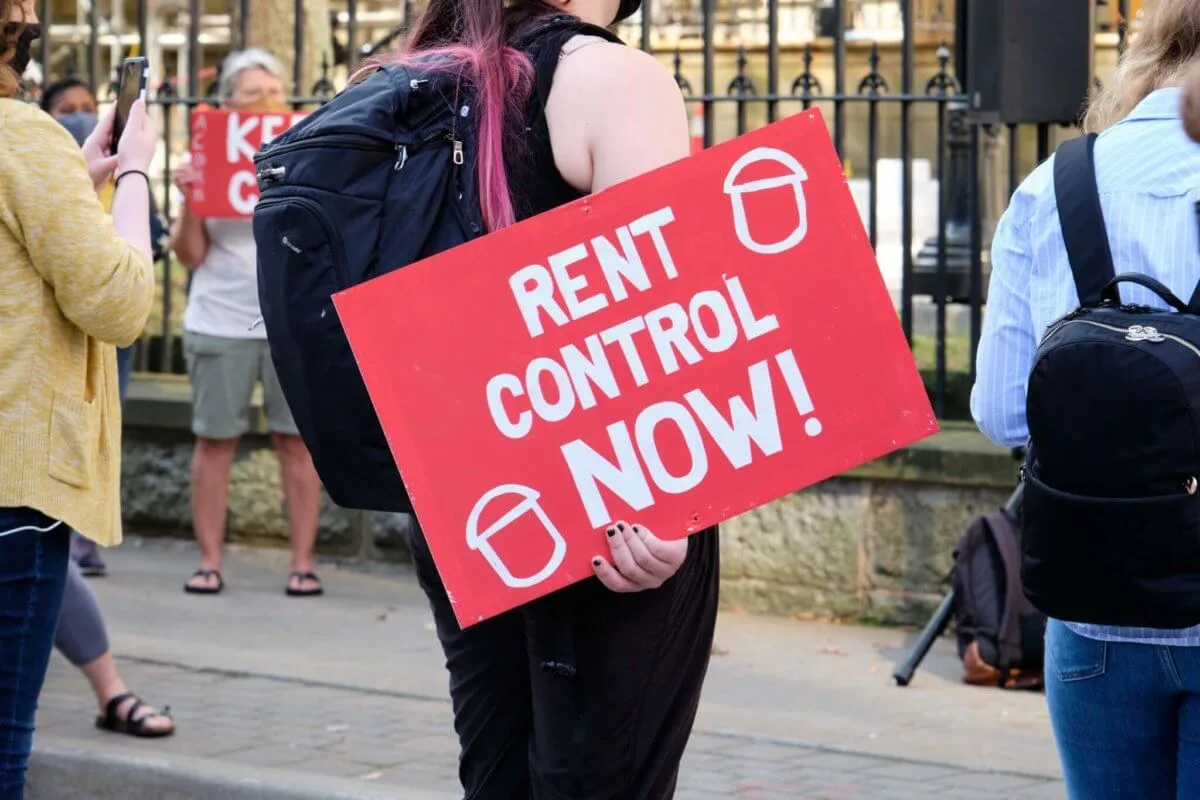
Arizona is one of dozens of states that prevent municipalities from passing their own restrictions on rent.
Jesse Krist got used to small rent increases over the seven years he’s lived in his Tempe two-bedroom apartment—maybe a $50 to $60 bump each rent cycle.
But when he got hit this month with a more than $400 increase—a hike of over 40% —he was left scrambling.
“I’m a single parent,” Krist told The Copper Courier. “ … I don’t make super great money so it’s kind of stressful.”
He also noted this increase was coming despite outstanding repairs in his unit and no plans from the complex for renovations. “They’re charging a little more than $400 more and no tangible change to my unit,” he said.
Krist is not alone—renters have been reporting big price jumps across the Valley and the state.
Arizona saw a more than 27% increase in average rent cost from 2020 to 2021, according to an Apartment Guide analysis. The average rent in 2020 was $1,217 and hit $1,553 last year.
Krist said when he was looking for a new place, he couldn’t find anywhere charging the same as his current rent of about $1,000 a month, but he could find places in between that and his new rent of $1,460.
Renewing his lease at his current place is seemingly out of the question. “I mean, it would be really hard. I guess I’d have to be really desperate to do that,” he said.
No Rent Control
Krist said he lived in California for a while and got used to having rent control there. Rent control is when a state or municipality places a cap on how much landlords can increase what they charge each year.
Krist assumed Arizona had it in place as well, until receiving his latest lease renewal offer.
Not only does Arizona not have rent control, it is one of more than 30 states that prevent municipalities from passing their own restrictions on rent.
Rent control is uncommon across the US. Only Oregon and California have statewide rent control, while 182 municipalities located in California, New York, New Jersey, Maryland, and Washington DC impose limits on rent increases.
If Krist lived in Oregon, for example, his rent could have only gone up by 9.9% this year. And California’s statewide rule would have capped any increase for him at 10%.
While bills to bring rent control to Arizona have been introduced—including SB 1099 this session—they haven’t gotten anywhere in the Legislature. Last year, a bill that would prevent any rent increases during a state of emergency didn’t come to a vote.
“It just doesn’t gain traction,” Joanna Carr, research and policy director for the Arizona Housing Coalition, told The Copper Courier.
“When I’ve had conversations with leaders in our field … when you mention rent control, it’s just always kind of like a shaking of head, like it’s never going to happen in Arizona.”
Pros and Cons
Carr said the idea of rent control sounds good because it offers a quick fix to a widespread problem, but it doesn’t get to the root of the problem.
“We certainly don’t have enough affordable housing and rent is just being driven up by that,” she said. “… and so with rent control, we’re not really fixing that problem, which is that we need more units of affordable housing.”
Rent control actually has the ability to reduce supply even further, Carr said.
“If you set a limit to the amount of rent a landlord can charge, the result then will be less landlords offering rental housing, and so therefore rent control risks damaging the existing supply, which we’re already struggling with,” she said.
RELATED: Metrocenter is Expected to Be Demolished. Here’s What’s Going in Its Place.
Arizona also has a law banning municipalities from regulating short-term rentals, Carr noted, which could mean landlords would switch over long-term rentals to avoid a rent cap.
And there are other ways to get around rent control. Carr noted an example in Berlin, Germany, where landlords have charged exorbitant fees for furnishing to get past a new rent cap.
“In an ideal world, I really like the idea of rent control because it seems that we need a really drastic fix to this problem, and we need a quick fix to this problem,” Carr said. “But there’s pros and cons to it.”
A Growing Problem
Carr said unaffordable rents are a growing issue in Arizona, now affecting more parts of the community.
“Before the pandemic, we were really focused on affordable housing development … and it was very much focused on extremely low-income and low-income renters who were affected, our most vulnerable population,” she said. “And now it’s extended beyond that to the point where now it’s our essential workers, it’s our nurses, our teachers, who are also struggling with this.”

She said the community needs more support from legislators and policymakers to make change happen.
“I think one positive thing … is that people who have been impacted have political power in terms of being voters and so that means it’s of more interest to our lawmakers,” she said.
Looking for the latest Arizona news? Sign up for our FREE daily newsletter.
Support Our Cause
Thank you for taking the time to read our work. Before you go, we hope you'll consider supporting our values-driven journalism, which has always strived to make clear what's really at stake for Arizonans and our future.
Since day one, our goal here at The Copper Courier has always been to empower people across the state with fact-based news and information. We believe that when people are armed with knowledge about what's happening in their local, state, and federal governments—including who is working on their behalf and who is actively trying to block efforts aimed at improving the daily lives of Arizona families—they will be inspired to become civically engaged.


He said what? 10 things to know about RFK Jr.
The Kennedy family has long been considered “Democratic royalty.” But Robert F. Kennedy, Jr.—son of Robert F. Kennedy, who was assassinated while...

Here’s everything you need to know about this month’s Mercury retrograde
Does everything in your life feel a little more chaotic than usual? Or do you feel like misunderstandings are cropping up more frequently than they...

Arizona expects to be back at the center of election attacks. Its officials are going on offense
Republican Richer and Democrat Fontes are taking more aggressive steps than ever to rebuild trust with voters, knock down disinformation, and...

George Santos’ former treasurer running attack ads in Arizona with Dem-sounding PAC name
An unregistered, Republican-run political action committee from Texas with a deceptively Democratic name and ties to disgraced US Rep. George Santos...





